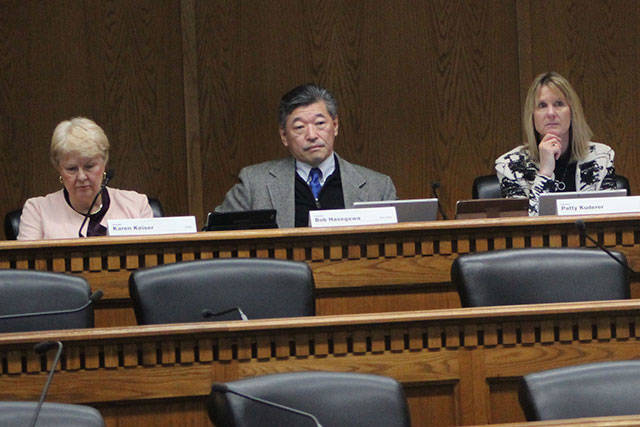By Taylor McAvoy
WNPA Olympia News Bureau
Proposals before the state Legislature would grant new protections from sexual harassment and bullying in the workplace.
The bills come after national reports about Hollywood producer Harvey Weinstein’s alleged repeated bullying and sexual harassment of women who worked for him. The news came at the same time the #MeToo Movement was re-ignited across the country.
In response, lawmakers in Washington state are trying to change the workplace culture and ensure that people who are subjected to bullying or harassment feel empowered to report any abuse.
A Senate committee heard a package of workplace-focused bills on Wednesday, Jan. 24. The proposed laws would ban non disclosure agreements regarding sexual harassment, require any employee contract to preserve the right to file a sexual harassment complaint, and prohibit workplace bullying of any kind.
SB 5996, sponsored by Senator Karen Keiser, D-Kent, would prohibit an employer from requiring a nondisclosure agreement that would discourage disclosing sexual harassment or sexual assault. The bill also provides that such a clause in an employment agreement would be void in court.
Washington is an at-will employment state, which means an employee or employer can end the job at any time, unless there is an employment contract. SB 6313, also sponsored by Keiser, would require any mandatory employment contract broader than a nondisclosure agreement to preserve the right of the employee to file a sexual harassment or sexual assault complaint in court.
Keiser’s SB 6471, creates a work group through the Human Rights Commission to develop a model of best practices around sexual harassment in the workplace.
Under federal and Washington state law employers can require employees, as a condition of employment, to sign a nondisclosure agreement that prohibits disclosure of certain company facts. This is meant to protect trade secrets and details that would harm the company, but lawmakers fear it could also chill speech about sexual harassment.
It is already unfair practice under the Washington Law Against Discrimination for an employer to retaliate against an employee for disclosing sexual harassment, but the law does not say an employee can still take action despite a nondisclosure agreement.
A similar bill, SB 6068 sponsored by Senator David Frockt, D-Kenmore, specifies that nondisclosure agreements cannot be used against a victim in criminal or civil lawsuits and requires the court to ensure the victim’s privacy unless he or she consents to disclosure.
“There would be no ‘Me Too’ movement in this country if women were not allowed to complain and speak up if they need to,” Washington Employment Lawyers Association attorney Katie Chamberlain said.
While she supports the bill’s goals, she said the bill should include a clause regarding arbitration agreements. Chamberlain said this can be problematic in employment contracts because someone might unknowingly sign away their right to sue in court if faced with sexual harassment.
Sexual harassment is a pervasive issue. A Washington Post-ABC News Poll in October 2017 found that 64 percent of Americans think sexual harassment in the workplace is a serious problem. The poll marks a significant increase from the 47 percent in the poll from 2011. The study also found that three in 10 women received unwanted sexual advances from a coworker.
Barbara Baker, commissioner for the Washington Department of Fish and Wildlife, said these measures would respond to sexual harassment in ways that change workplace culture. This comes after multiple sexual assault and sexual harassment allegations against management at the Department of Fish and Wildlife recently came to light. A former manager is currently awaiting sentencing for a conviction on rape and burglary charges.
“It’s not a partisan issue,” Baker said. “We have a real problem, people are finally talking about it, and this is a good start.”
A broader form of workplace harassment is addressed in SB 6435, sponsored by Senator Annette Cleveland, D-Vancouver. Her bill, which targets bullying, defines an abusive work environment and provides narrower liability standards than that of the Washington Law Against Discrimination. She said the bill is important because it protects those employees who are not in a protected class under the law against discrimination.
“Sometimes the conditions in the workplace are so egregious that we have to step in,” said Senator Maralyn Chase, D-Edmonds, who is sponsoring a similar bill, SB 5423.
Gary Namie, a social psychologist and founder of the Workplace Bullying Institute, said that workplace bullying is three times more prevalent than sexual harassment and often victims feel more fearful to speak out.
He said sexual harassment has a legal protection already, but workplace bullying is not addressed by the current anti-discrimination law.
“This is a bill no good employer should fear,” he said.
This story is part of a series of news reports from the Washington State Legislature provided through a reporting internship sponsored by the Washington Newspaper Publishers Association Foundation.



